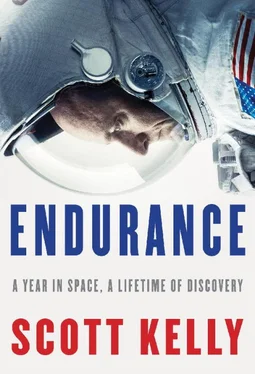As always with newcomers to the space station, Tim and Tim are as awkward and clumsy as toddlers. Sometimes when I want to help one of them get to where he needs to be, or want to get one of them out of the way quickly, I find it’s easiest to physically grab him by the shoulders or the hips and move him around in space the way I’d move a bulky piece of cargo. Neither of them seems to mind.
The next day, I hear during the daily planning conference that we have a problem. The mobile transporter is stuck—it is attached to the CETA cart I worked on during my second spacewalk with Kjell. Flight controllers had started to move it to a different work site near the center of the truss so the robotic arm would be in position to perform some maintenance activities before the new Progress arrives next week. But it quickly became stuck in a position that makes dockings impossible for future visiting vehicles. The moment I hear these words, my heart sinks. I immediately know what went wrong: when I was working on the CETA cart, I must have inadvertently locked the brakes while tying down the brake handles.
“I think I know who screwed that up,” I tell Houston.
Later, I get on the phone with the flight director and tell her I’m almost certain about the brake handle.
There is a pause on the other end of the connection. “How certain are you?” she asks.
“Very certain,” I say. I know what my answer will mean: I will have to do an unplanned spacewalk before the Progress can dock, and it’s launching a week from tomorrow. We’ll have a terrifyingly short period of time to prepare, both in space and on Earth.
It’s important to me to admit mistakes immediately, and I don’t make excuses. But I think to myself that I should not have been asked to do that task in the first place when I couldn’t give it the proper amount of attention. Working with the cart had been an afterthought, and there is no place for afterthoughts when you’re outside in space.
If some other piece of equipment had been left in the wrong configuration, we could likely wait until the next scheduled spacewalk, even if it was months away, to fix it. But the mobile transporter is now stuck between work sites and isn’t secure enough to withstand the forces of Progress dockings. In addition to making it impossible for us to dock visiting vehicles, the stuck cart prevents us from moving the station in order to avoid debris, firing thrusters to reduce the momentum on our gyros, or using the robot arm for anything else. I start mentally preparing myself to go outside for the third time. I share the news with the Russian crew, and they say they will help in any way necessary. The next day, NASA makes the official decision that we will try to fix the transporter on an emergency spacewalk.
It’s hard enough to prepare for a spacewalk under ideal circumstances; it’s much harder to do it on short notice and with colleagues who are still acclimating to this strange environment. Tim Kopra, though an experienced astronaut, has been here only a few days and is still adjusting to living in space. He will have to get into a spacesuit and venture outside with me. Tim Peake, who is still figuring out the most basic aspects of life up here, like eating and sleeping, will have to serve as IV. Both of them will have little margin for error in their demanding jobs.
I email Amiko that I may have to go outside again next week, expressing my frustration with myself for being such a dumbass to have locked the brakes. She is sympathetic—she knows better than anyone but Kjell what the previous two spacewalks were like both physically and mentally. I also mention to her that Tim Kopra has a strange habit of repeating me. If I say, “I wonder if there’s any football on today,” Tim will say, as if I had never spoken, “I wonder if there’s any football on today.” I mentioned to Tim that my calf muscles have shrunk dramatically since I’ve been here, and he immediately responded, “My calves have shrunk dramatically too.”
“But Tim,” I said, “you just got here.”
“Yeah, but I have really small calves.”
This is not something I ever noticed about Tim working with him on the ground, and it’s not like me to get annoyed by a crewmate—I’ve made it this long without being annoyed by anyone, which I think proves I’m pretty tolerant. Amiko suggests that maybe Tim is feeling insecure about joining me as a crewmate when I’ve been up here for so long. I agree and tell her I also wonder if it’s just me.
The Russians spend the next few days packing trash into the Progress, which will be departing soon to burn up in the atmosphere. They have some extra room and ask if we want to put trash on board. Like many things in space—oxygen, water, food—trash removal capacity is a resource, and our two countries trade it like currency. I give them a couple of our large trash bags without telling Houston I did so. It would create a lot of work for people on the ground to ask permission, and we would likely not be granted permission anyway. I’ve been doing this all year, sneaking trash off the space station when the Russians have room for it, and we help them out too when we can. (This will cause a problem later when we pack the Cygnus and don’t have all the trash Houston thinks we should—ten bags. After a lot of questions, I eventually tell them, “The trash fairy must have come in the middle of the night.” No one mentions it again, which is a relief.) On December 19, I watch from the Russian service module as Sergey and Yuri monitor the departure of Progress on their displays as it inches away almost imperceptibly. As with the Soyuz, they can take over manually if there is a malfunction, but everything goes according to plan. Now that Progress is gone, we have room for the new Progress that will launch in a few days. I realize the next time something pushes away from the station, two and a half months from now, it will be me.
—
IN THE MORNING, I find an email from the ground asking me to submit a guest list for my landing. A limited number of people will be allowed to come to the control center in Houston to watch on the big screens as our Soyuz lands in Kazakhstan. I start making a list: Amiko, Samantha, and Charlotte. My dad, Mark, and Gabby. Gabby’s chief of staff, Pia. Amiko’s sons, Corbin and Tristan. My friends Tilman, Todd, Robert, Gerry, and Alan. Sarah Brightman. I picture the spectator area in mission control, canted seats behind glass, my friends and family gathered there and watching as our capsule falls through the atmosphere and lands—we hope—safely on the desert steppes of Kazakhstan.
Suddenly it occurs to me that making this list is the first thing I am doing to prepare for my return to Earth. From now on I will do more and more—throwing things out, packing things up, making more lists, thinking about what my next steps will be in life. I have a lot more time in space to go, but as of today a small part of my mind is on my future on Earth.
Tim, Tim, and Yuri will still be up here when I leave, less than three months from now. As the end is drawing nearer, my remaining time seems to stretch out longer, like taffy. I’m three-quarters of the way through—it should all be downhill from here. Yet when I allow myself to think about it, I remember the first three months, the way it felt when my first set of crewmates left, how long it felt like I’d already been here, how long ago that was. I can barely remember what Terry, Samantha, and Anton look like, what their mannerisms are, or what their voices sound like, the sound of Samantha humming. Like old friends who drifted away long ago, they are now a distant memory.
Running through the rain, driving a car, sitting outside, smelling fresh-cut grass, relaxing with Amiko, hugging my kids, deciding what to wear—it is hard to remember such acts with any specificity. I no longer have any sensory reminders of what they feel like. I am a fully acclimated space creature, and my return doesn’t seem much closer than it was when I started. I will still be up here, in the same small spaces, for months.
Читать дальше












